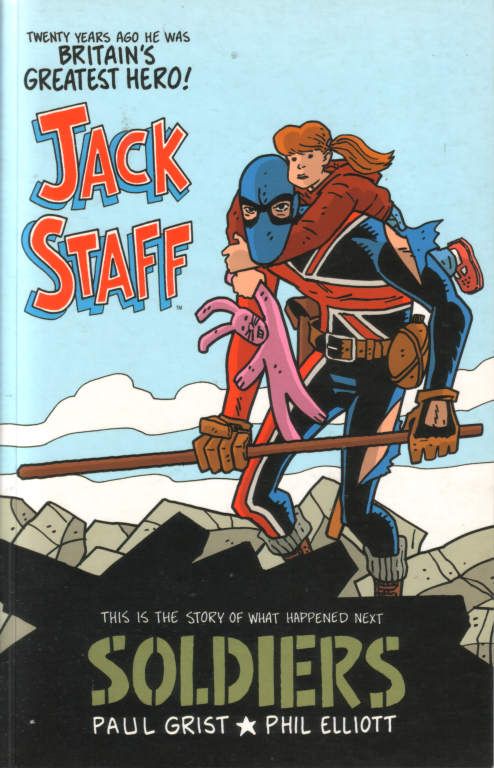
Jack Staff, Vol. 2: Soldiers
By Paul Grist and Phil Elliot
Image Comics: 2004
I read and reviewed Paul Grist's first Jack Staff collection a few weeks ago, so it's probably not surprising that I have devoured the second volume. Soldiers is a bit of a change from Everything Used to be Black and White in a specific way: it is in color. I don't want to say the color is bad, because Phil Elliott did a great job doing whatever all the things are that colorists actually do in this digital age, and the book looks great, but after reading a collection of twelve issues in black and white, it was a bit jarring, and Grist's illustrations are so strong they don't seem to need colors anyway.
The story itself continues to backfill Jack's history, filling us in on why (at the start of the first volume) he had been absent from heroing for twenty years. It features the now-familiar cast of reporters, cops, agents, robots, and supervillains, most of whom would be as comfortable on an ITC television series as in a comic book. Grist continues to develop his mastery of the multi-layered narrative and provides us with another ripping yarn, fraught with portent and hidden depth, but it is on three of those supporting characters whom I would like to focus today.
Becky Burdock, Vampire Reporter
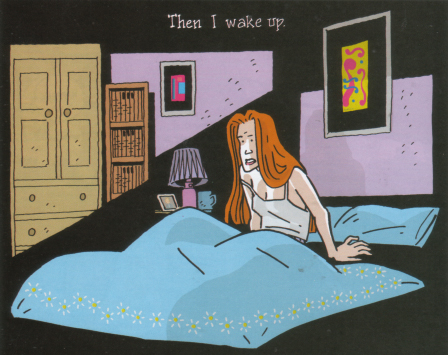
A modern Nellie Bly in Annie Hall's castoffs, Becky is driven, dedicated, and competent; young, but no ingenue, and a decidedly non-nosferatic vampire, she is a professional whose agenda sometimes parallels and sometimes conflicts with Jack's. There might be the slimmest hints of the beginnings of some sort of romantic entanglement in their relationship, but mostly they find themselves circumstantial allies trying to survive the same catastrophes.
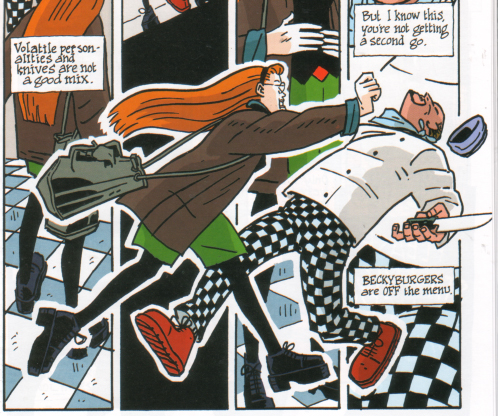
I have noticed that twice so far, Jack has responded to requests for assistance from Becky by saying he was too busy to help; Becky has gotten herself out of the situation anyway: so much for the damsel in distress trope. Jack had better be careful, or she'll stop letting him tag along on her adventures.
Helen Morgan, Q Branch
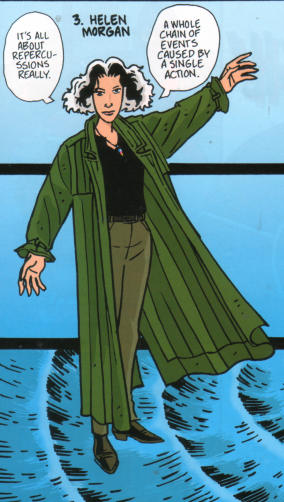
Morgan is the enigmatic lead agent of Q Branch, an X-Files-like unit that kicks a bit more ass than Fox and Scully ever did. She puts me in mind of what the Phantom Stranger might be like if he joined the civil service; mysterious and powerful, but in a mundane and quotidian way, a George Smiley of the paranormal. Her quiet presence drives and directs the efforts of the splashier coppers and super-cops, but she's not at all hesitant to get down and dirty when she needs to.
How tough is she? Well, in Soldiers, Detective Inspector Maveryk, consumed by a mysterious rage effect plaguing the community, surprises her and beats her to death with his police baton in an interrogation room, and then drunkenly awaits his discovery and arrest in the squad room. Here's the upshot:
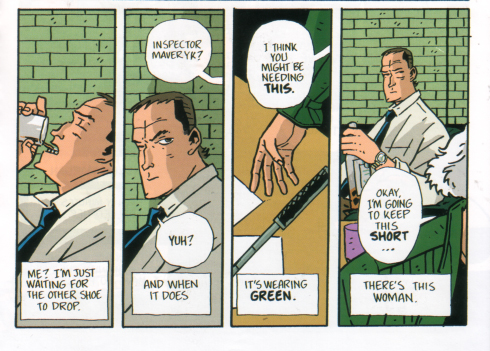
Now that's tough - not a word, not even a look. Don't mess with Helen Morgan.
Liz Stewart, Special Military Intelligence, Lethal Executive
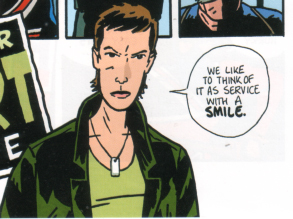
Were Bruce Willis a woman, he might be able to play Commander Stewart, if he could reign in his soft side. This hard-as-gravel military operative is strong, single-minded, and smart. Whether facing up to an out-of-control superior officer or fighting her way through a town of enraged killers, she is in control, and puts the "no" in no-nonsense. Here she is mixing it up with The Claw, a Q agent who is invisible except for his electric hand:

Stewart was introduced only this volume, but I am looking forward to seeing more of her - as long as she's not after me.
What do these three characters have in common? Besides being cool, they are all women. I know I recently read a post somewhere that argued against praising writers for writing strong female characters because, after all, that's just what they ought to be doing, and we shouldn't praise people for merely doing the right thing. I find myself forced to disagree with this position; sometimes doing what we should do, in the face of peer pressure or tradition or temptation or even just ease and inertia, is noteworthy, at least to the degree that such attention would encourage further good work. It is in that spirit that I single out Paul Grist for this particular praise.
Becky Burdock, Helen Morgan, and Liz Stewart are all fascinating and colorful characters and could have - and likely would have - been written as typical male characters by a lesser talent; I call this progress, of a sort. Each of them is a woman, but none is The Woman: each has a purpose, role, and a nature beyond her gender alone.
Yet, we get the sense that each one is fully-fleshed-out character whose gender is part and parcel of her makeup, not just a random characteristic chosen from a character-generation program for an RPG, or a checkmark on a diversity quota list. There is no T&A in this book, but if women are your fancy, I defy you to read this without falling a little bit in love with at least one of these characters, because they are all real and wonderful.
And that, my friends, is worthy of note.
Bonus Strong Female Lead: Patti Smith

This is the cover of the "What's Happening" section of the Seattle Post-Intelligencer, one of those inserts that come out on Fridays with arts and events calendars. The cover story features Patti Smith, who was having a show in town, and the story applauded her neverending battle against the commercialization of rock.
As soon as I looked at the cover, I got it, but to be test it out, I showed it to my partner, a non-comics-reading female person, and asked her what she saw. She almost immediately said "She's supposed to be Wonder Woman." I asked what made Patti Smith into Wonder Woman; she pointed at the tiara, and then noticed the wristbands as well.
Now, if that's not iconic status, I don't know what is. I don't care what anyone says, for pop culture reasons alone, Wonder Woman is, and always will be,one of the big three.
Now, if they could only get her comic right...



